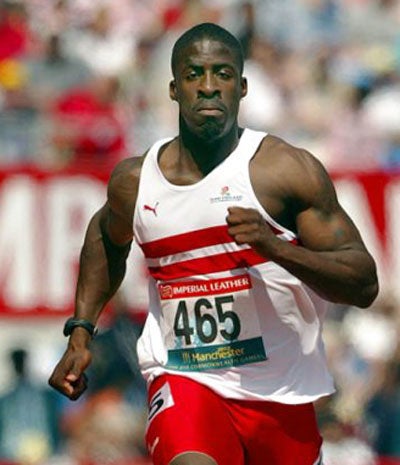Athletics: Chambers' drug admission to be costly for Britain

UK Athletics is set to lose the European gold medals for the 100 metres and the 4x100m relay following an admission by Dwain Chambers that he was taking an illegal performance-enhancing substance when the Championships took place in Munich three years ago.
Chambers, who is due to return to competition in February after serving a two-year ban for taking the steroid THG (tetrahydrogestrinone), has revealed that he first experimented with the substance in March 2002. The 27-year-old Londoner was offered the steroid by Victor Conte, who has just started a four-year jail sentence following a Federal investigation into the Balco laboratory he ran in San Francisco.
Chambers' statement, reported in yesterday's Mail on Sunday, means he is set to lose the European title he won in a Championship record of 9.96sec and will also lose the joint European record of 9.87 that he went on to set in September of 2002. The latest news would also invalidate Britain's victory in the sprint relay in Munich, where Chambers anchored the team home in a time of 38.08sec. His team-mates on that day - Darren Campbell, Christian Malcolm and Marlon Devonish - were the same ones who secured silver with Chambers in the following years' World Championships. All three had to give back their relay medals from Paris 2003, and now they face having to dig out another medal from their collections to hand back to the International Association of Athletics Federations.
Chambers' problems began in September 2001, soon after he had finished fifth at the World Championships, when he decided to split with the coach who had guided his career, former Olympic 100m finalist, Mike McFarlane. He was invited to join the Miami training group, run by a Ukrainian, Remi Korchemny, who helped Valeri Borzov to the Olympic 100m gold in 1972. Korchemny, who is due to be sentenced next month for his involvement in the illegal drugs ring centred at the Balco lab, introduced Chambers to Conte in January 2002.
Two months later Chambers attended Conte's lab and underwent a series of blood tests to determine his dietary requirements.
"Victor came up with a series of nutritional supplements, one of which was THG," Chambers said. "It was droplets which you applied under the tongue. I took it three or four times a week.
"I was suspicious. I had never taken anything like that before. It was not just powder, like the other nutritional supplements we took. I knew that this was something different. In the back of my mind I thought: 'Hmm, I don't know about this'. But I still went along with it. I didn't want to question what he was giving me. I didn't want to undermine his knowledge of his supplements. None of his athletes have tested positive for drugs, so I thought it must be all right."
What Chambers did not realise then was that an anonymous tip-off to the doping authorities was about to provide information about THG, up to then an undetectable "designer" steroid.
Despite using this mysterious substance, Chambers' performances did not improve dramatically. He could manage only eighth place in the 2002 Commonwealth Games, where he complained repeatedly of suffering from cramp. Cramping is a problem sometimes associated with steroid use.
A month later, however, Chambers' ambitions began to approach realisation as he won the European title convincingly. But the following year he suffered further disappointment at the World Championships, missing out on a medal in the 100m and losing a lead over the Americans on the final leg of the sprint relay. By the end of those championships the authorities were already on the trail of THG.
Following a raid by US federal agents on the Balco lab, a number of samples were re-tested and Chambers soon heard that he had failed.
Chambers, who needs to pass two more statutory drug tests before he can be cleared to run, appears sanguine about losing his record and two more medals. "It doesn't worry me now," he said. "If they want to take it, that's fine because there are certain rules of procedures that we need to follow and by failing a drugs test, I violated that. I believe I'm good enough to go out there and regain those titles."
Whether his three team- mates will greet this latest news as calmly remains to be seen.
How THG trail led to top British sprinter
* At the time Chambers won his two gold medals in the 2002 European Championships the steroid he was taking was not known to the doping authorities. An anonymous donation of a quantity of the "designer" steroid, in a used syringe, to an International Olympic Committee testing lab, changed all that. This action, for which Trevor Graham, former coach of Olympic champion, Marion Jones, later admitted responsibility, allowed the authorities to devise a test and Chambers was banned after they had re-investigated a urine sample taken from him while he was training in preparation for the World Championships.
A Federal investigation into the source of the substance - Victor Conte's Bay Area Laboratory Co-operative, in San Francisco - led to a succession of charges. Conte has just begun a four-year jail sentence. Chambers' former coach, Remi Korchemny, will be sentenced next month. A number of other athletes associated with Balco have been banned, including the former world 100m record holder, Tim Montgomery, who is currently appealing against a life ban.
Subscribe to Independent Premium to bookmark this article
Want to bookmark your favourite articles and stories to read or reference later? Start your Independent Premium subscription today.

Join our commenting forum
Join thought-provoking conversations, follow other Independent readers and see their replies